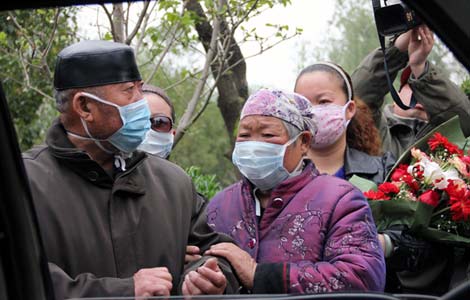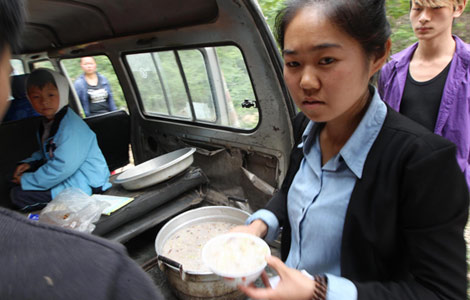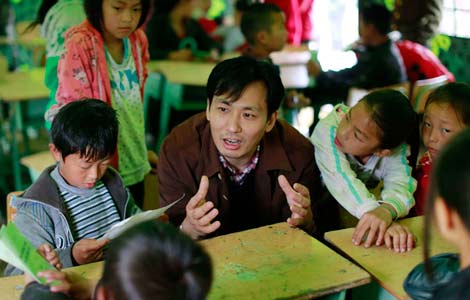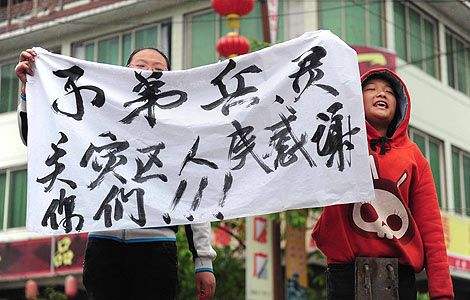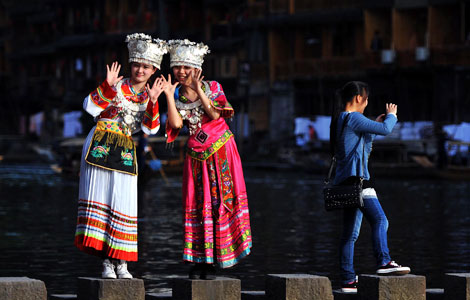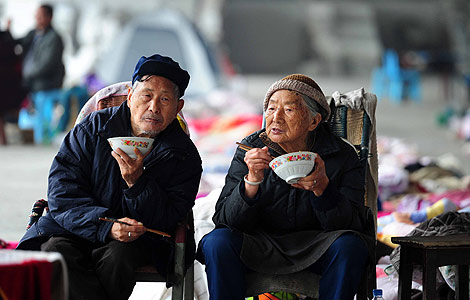Disaster: Self help and survival
Updated: 2013-04-25 07:30
By Hu Yongqi in Ya'an, Sichuan, and He Na and Jiang Xueqing in Beijing (China Daily)
|
||||||||
Self-help measures
Taking measures to help oneself and others plays a critical role in disaster relief, according to Zhang Zhirong, director of the emergency response office of the People's Government of Guangyuan, a city in Sichuan province. "The disaster-stricken counties and towns are scattered across a wide area. They stand some distance from the government-led rescue teams. By the time these teams arrive at the scene, several hours or even a day might have already passed. If the villagers in Lushan county had not made efforts to help themselves and each other in the first few hours after the earthquake, many lives would have been lost," said Zhang.
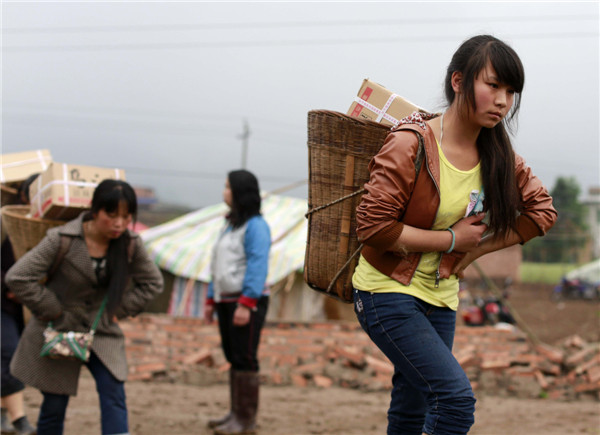 |
|
Villagers form a human convoy to transport boxes of essential supplies. Photo by Feng Yongbin / China Daily |
Blocked roads, communications breakdowns and a number of other factors meant the rescue teams and supplies were unable to reach all the quake-hit areas as quickly as they would have liked.
Some places, especially those in remote mountain areas or far from the media spotlight, have to depend on themselves to get through the initial aftermath of disaster. The earthquake left a huge trail of destruction, but the number of villages and areas in which residents took survival into their own hands is testament to the value of preparedness.
For that, the Wenchuan earthquake can take some of the credit. The experience gained by those who survived the deadly quake reduced the loss of life and injury.
After Saturday's quake, reporters discovered that in village after village, residents had quickly formed task groups, each with an appointed leader, to begin the search for survivors and food, and to shore up damaged property.
'Communal life'
Four ovens made from mud stood like guards protecting the only road connecting Shangba village, in Lingguan town, Baoxing county, with the outside world. The earthquake claimed one life in Shangba and injured a dozen residents. Almost all the houses in this village of 1,400 people were destroyed.
Steam rose from four large black metal pans on the mud ovens as people stood in line, clutching different-sized containers. Chen Yuexia, 39, who had volunteered to cook, held a large ladle to serve porridge.
"The rice was rescued from the destroyed houses. We put all the food together. People have adhered strictly to the order of service: the elderly and children go first, then the women and men.
"It reminds me of the communal life I saw on TV in the 1950s, where people cooked, ate and worked together. I am confident that the hard times will pass soon, as long as we're united," Chen said.
Life in the greenhouse
The first batch of disaster relief supplies didn't arrive at Wangjia village in Longmen town until more than 30 hours after the quake. A military rescue team brought some rice, but no tents.
Villagers rescued a few items from the damaged houses and erected several makeshift shelters. But for the 3,700 residents, the arrangements only scratched the surface.
It rains a lot in Ya'an and Wangjia's village head, Yang Jinhua, was concerned about the lack of accommodation for the villagers who'd been forced out of their homes. Risking falling rocks and aftershocks, Yang rode his son's motorbike to the town government to ask for help. However, he was told that tents are in short supply across the region.
Yang was at his wit's end, when he remembered the nine greenhouses where he raises medicinal plants. To provide some cover from the weather, Yang decided to rip out the plants and move as many of the villagers inside as possible, despite his crop being almost ready for harvest. He estimates that he's lost around 90,000 yuan ($14,600), but is unrepentant. "I couldn't allow the elderly and children to sleep in the rain; people are more important than money," said the 59 year old.
Hu Guangrong, 48, runs a small store in the village. When it collapsed, the glass counters were smashed by falling bricks.
In the short space between aftershocks, Hu managed to collect some drinks, tomatoes and dried noodles, which he distributed to his fellow villagers, refusing payment. "It would have been better if I'd stocked a greater amount of food. Actually I thought I still had some eggs, but they were all smashed during the quake," he said.
Most Viewed
Editor's Picks

|

|

|

|

|

|
Today's Top News
Xi meets former US heavyweights
Li in plea to quake rescuers
Canada to return illegal assets
Beijing vows to ease Korean tensions
Order restored after deadly terrorist ambush
Nation sets sights on bigger carrier
Hollande's visit expected to open new chapter
2nd aircraft carrier will be larger
US Weekly

|

|
